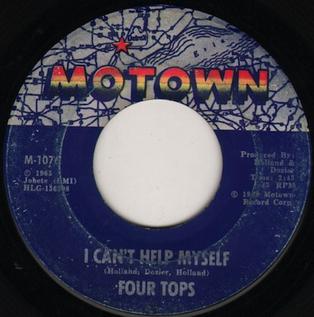
"I Can't Help Myself " is a 1965 hit song recorded by the Four Tops for the Motown label.

"Baby I Need Your Loving" is a 1964 hit single recorded by the Four Tops for the Motown label. Written and produced by Motown's main production team Holland–Dozier–Holland, the song was the group's first Motown single and their first pop Top 20 hit, making it to number 11 on the US Billboard Hot 100 and number four in Canada in the fall of 1964. It was also their first million-selling hit single.
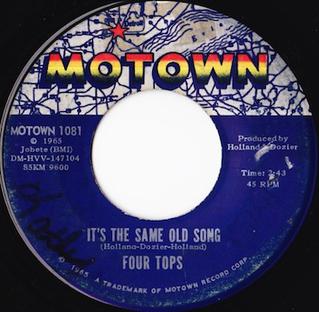
"It's the Same Old Song" is a song recorded by the Four Tops for the Motown label. It was released in 1965 as the second single from their second album. Written and produced by Motown's main production team Holland–Dozier–Holland, the song is today one of The Tops' signature songs, and was reportedly created—from initial concept to commercial release—in 24 hours. It reached No. 5 on the Billboard Hot 100 and No. 2 on the Billboard R&B chart. It also reached number 34 in the UK.

"Bernadette" is a 1967 hit song recorded by the Four Tops for the Motown label. The song was written and composed by Holland–Dozier–Holland, Motown's main songwriting team, and produced by Brian Holland and Lamont Dozier.
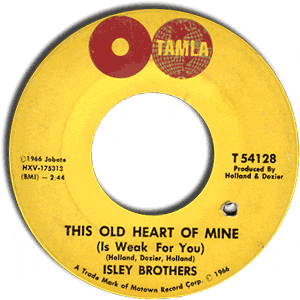
"This Old Heart of Mine " is a Holland–Dozier–Holland song that was a hit for American musical group the Isley Brothers in January 1966 during their brief tenure on Motown's Tamla label. Featuring Ronald Isley on lead vocal, "This Old Heart of Mine" peaked at number twelve on the Billboard Hot 100, and at number six on the Billboard R&B Singles chart.

"Nowhere to Run" is a 1965 pop single by Martha and the Vandellas for the Gordy (Motown) label and is one of the group's signature songs. The song, written and produced by Motown's main production team of Holland–Dozier–Holland, depicts the story of a woman trapped in a bad relationship with a man she cannot help but love.

"Heat Wave" is a 1963 song written by the Holland–Dozier–Holland songwriting team. It was first made popular by the Motown vocal group Martha and the Vandellas. Released as a 45 rpm single on July 9, 1963, on the Motown subsidiary Gordy label, it hit number one on the Billboard Hot R&B chart—where it stayed for four weeks—and peaking at number 4 on the Billboard Hot 100.
"Come and Get These Memories" is an R&B song by Motown girl group Martha and the Vandellas. Their second single released under Motown's Gordy Records subsidiary, "Memories" became the group's first hit single, reaching number 29 on the Billboard Pop Singles Chart, and number-six on the Billboard R&B Singles Chart.
"Love Bug Leave My Heart Alone" is a 1967 single released by Motown girl group Martha and the Vandellas. The song's production was a departure from the Vandellas' repertoire as their label, Motown, was having a harder time staying with the times in the music industry and having a much harder time finding a hit for its acts after several departures including Vandellas collaborators William "Mickey" Stevenson and Holland-Dozier-Holland, who produced the b-side to this single, "One Way Out", one of the trio's final recordings with the Vandellas. Produced by Richard Morris, the song displayed of the narrator wanting "the love bug" to leave her alone so she won't "fall in love". The narrator, lead singer Martha Reeves, was left heart-broken the last time she allowed the man to come back to her but after suffering heartbreak, she expresses her disgust at the man's attempts, with her fellow members Rosalind Ashford and Betty Kelley chanting "get outta there, love bug, leave my heart alone". The song was their second consecutive Top 40 single of 1967 peaking at number twenty-five on the Billboard pop singles chart and number fourteen on the Billboard Hot R&B singles chart. The record was the first track ever played on UK Radio One by DJ John Peel.
"If I Were a Carpenter" is a folk song written by Tim Hardin in the 1960s, and re-recorded with commercial success by various artists including Bobby Darin, The Four Tops and Johnny Cash. Hardin's own recording of the piece appeared on his 1967 album Tim Hardin 2. It was one of two songs from that release performed by Hardin at Woodstock in 1969. The song, believed by some to be about male romantic insecurity, is rumored to have been inspired by his love for actress Susan Morss, as well as the construction of Hardin's recording studio.
"Little Darling " is a 1966 single written and produced by Holland-Dozier-Holland and recorded and released by Marvin Gaye on the Tamla label.

"Forever Came Today" is a 1967 song written and produced by the Motown collective of Holland–Dozier–Holland, and was first made into a hit as a single for Diana Ross & the Supremes in early 1968. A disco version of the song was released as a single seven years later by Motown group the Jackson 5.

"Take Me in Your Arms " is a song written by the premier Motown songwriting/production team of the 1960s Holland–Dozier–Holland. The first hit recording was sung by Kim Weston in 1965. It was most popular in 1975 when it was recorded by the Doobie Brothers.
"(Come 'Round Here) I'm the One You Need" is a 1966 hit single by Motown group The Miracles, released on Motown Records' Tamla label.
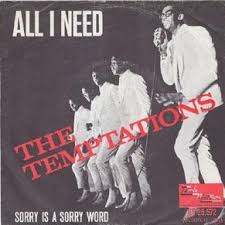
"All I Need" is a 1967 hit single recorded by The Temptations for the Gordy (Motown) label. It is the group's first single to be produced by Norman Whitfield's protégé Frank Wilson. Written by Wilson, Edward Holland, Jr. and R. Dean Taylor, the single was a Top 10 hit on the Billboard Hot 100, peaking at number 8; it was also a number-two hit on the Billboard R&B singles chart.

"I'm Gonna Let My Heart Do the Walking" is a disco-styled soul single composed by the Holland brothers Eddie and Brian, members of the former Holland–Dozier–Holland team and was released as a single by Motown vocal group The Supremes in 1976 on the Motown label. It was the first single since "Your Heart Belongs to Me" in 1962 to feature four Supremes. It is also notable for being the last top forty single the group would score before they disbanded in 1977.
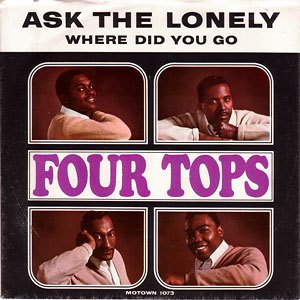
"Ask the Lonely" is a soul/pop ballad recorded by Motown singing group the Four Tops. Released as the group's third single, the single became the group's second successful single since signing with Motown in 1963. Released in 1965, the song rose to no. 24 on the pop chart and no. 9 on the R&B one. It is notable for being co-written by longtime Motown staffer Mickey Stevenson, as most of the group's hits on Motown were written and produced by Holland-Dozier-Holland. Levi Stubbs sang the lead, with The Andantes joining the other Tops on the background vocals. The music was performed by The Funk Brothers and the Detroit Symphony Orchestra provided the instrumentation.
"I Gotta Dance to Keep from Crying" is a 1963 hit by the Miracles on Motown's Tamla label. It was written and produced by Motown's main songwriting team, Brian Holland, Lamont Dozier, and Eddie Holland.

"Yesterday's Dreams" is a 1968 single recorded by The Four Tops for the Motown label. The song was written by Vernon Bullock, Jack Goga, Ivy Jo Hunter and Pam Sawyer. The single was one of the first the group released after the departure of Holland-Dozier-Holland, who had handled the majority of the Four Tops recordings prior to 1968. Released from the album of the same name, the song only became a modest hit on the US chart, peaking at #31 on Billboard's Best Selling Soul Singles chart and #49 on the Hot 100. Outside of the US, "Yesterday's Dreams" reached #23 in the UK.
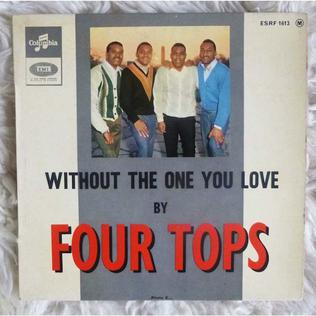
"Without the One You Love " is a song written by Holland–Dozier–Holland and released as a single in 1964 by the Motown singing group The Four Tops as the second single from their self-titled debut album, Four Tops. The group would later cover the song with The Supremes.














